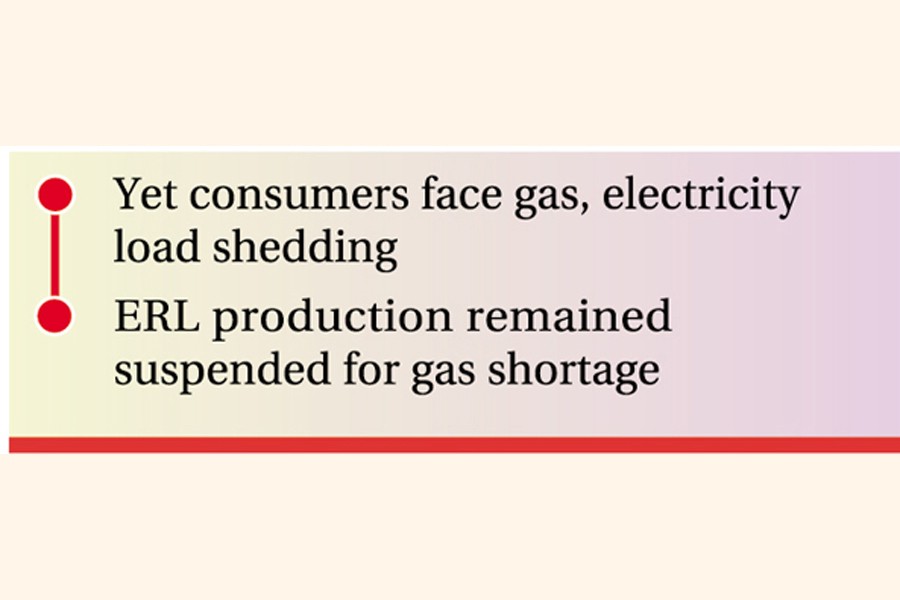One FSRU resumes re-gasification of LNG as cyclone Mocha dies down

Published :
Updated :

One of the country's two LNG re-gasification units resumed operation early Monday, but is yet to ease gas supply across the country.
"We could resume re-gasification at Summit Group's FSRU this (Monday) morning," Petrobangla chairman Zanendra Nath Sarker told the FE, saying that the FSRU was synchronised with the mooring system at Moheshkhali early in the morning.
The other one of Excelerate Energy, which was taken to the deep sea to avert possible cyclone Mocha mayhem, would take more time to resume re-gasification of liquefied natural gas (LNG), he said.
The floating, storage and re-gasification units (FSRUs) were disconnected from the mooring systems in the midnight of Friday last amid the cyclone alerts, suspending supplies to the gas-hungry national grid and power generation plants that caused severe gas and power load shedding across the country.
Despite yesterday's development, consumers were still suffering from the load shedding of gas and electricity as gas supplies were yet to reach the grid until Monday afternoon while the other FSRU is yet to resume re-gasification of LNG.
Natural gas pressure in the Chattogram part of the national grid, which was almost zero after suspension of the FSRUs, is expected to improve gradually, said the Petrobangla chairman.
Both the FSRUs were half full with LNG while suspending re-gasification, meaning each of the terminals had around 75,000 cubic meters of LNG stored, said a senior Petrobangla official.
Two LNG-carrying cargoes - one sourced from spot market and another from OQ - were staying in the deep sea to avert possible impact of cyclone Mocha, he said.
One LNG cargo from OQ, previously named Oman Trading International, was supposed to deliver LNG to one of the FSRUs on May 13 but will now deliver LNG on May 18.
The other cargo - a spot LNG cargo from French energy company TotalEnergies which was scheduled to supply LNG on May 16 - will now have to deliver on May 21 or May 22 under a reschedule for imported LNG cargoes, said the official.
The delivery of several other upcoming LNG cargoes will need to be rescheduled and accommodated with the current LNG re-gasification capacity, which is now half of the total capacity, he added.
Petrobangla has planned to enforce force majeure provision under the existing contracts with the LNG suppliers to avoid any penalty due to delays in receiving LNG cargoes from the suppliers, said sources.
Force majeure is a common clause in contracts which essentially frees both parties from liability or obligation when an extraordinary event or circumstance beyond the control of the parties, such as a war, strike, riot, crime, epidemic, or sudden legal change prevents one or both parties from complying with their obligations under the contract.
Pointing to the situation of FSRUs during the cyclone, the official said the Excelerate Energy's FSRU could be taken to the deep sea, but the one of Summit could not be de-plugged fully from the mooring system and hence was bound to stay with the mooring despite risks of damages.
Fortunately, the impact was not that much severe on the part of Bangladesh and the Summit's FSRU resumed operation quickly, he added.
Bangladesh's lone crude oil refinery - Eastern refinery Ltd (ERL) - with an annual capacity of 1.50 million tonnes remained shut since last Saturday morning due to the gas crisis, said a senior official at the state-run Bangladesh Petroleum Corporation (BPC). It would take 5-6 days to resume operation, he added.
The official, however, ruled out any possibilities of a petroleum crisis in the country due to the halt in crude oil refining, saying that the oil requirement will be met from the stock in the oil tankers.
The ERL, a wholly owned subsidiary of the BPC, produces mainly diesel, kerosene, jet fuel, and furnace oil from its refinery.
The country's overall natural gas supply dropped to around 2,150 million cubic feet per day (mmcfd) on Sunday last due to suspension of LNG re-gasifications, from around 2,810 mmcfd during pre-cease of FSRUs operation period on May 11.
Country's Power generation also dropped to around 10,000 MW on Sunday from around 13,000 MW on May 11, according to official data from state-run Bangladesh Power Development Board, or BPDB.
Bangladesh's main port city Chattogram, which is dependent entirely on re-gasified LNG from FSRUs, was almost non-functional with shutting of businesses, businessmen said.
All the 50 CNG filling stations in Chattogram remained shut since Friday night, immediately after the suspension of operations of the FSRUs, general secretary of Bangladesh CNG Filling Station and Conversion Workshop Owners Association Farhan Noor said.
Many ready-made garment industries and steel manufacturing factories either kept shut or squeezed operations due to the gas crisis.
State-run Karnaphuli Gas Distribution Company Limited (KGDCL), the lone gas distributor in the port city, expressed their regret for the dire situation to the Chattogram dwellers and stated that it would take up to 6-7 days to bring back normalcy.
According to KGDCL, at least 350 mmcfd of gas is required daily for the port city's households, businesses and the nearby fertiliser factories and power stations.
azizjst@yahoo.com


 For all latest news, follow The Financial Express Google News channel.
For all latest news, follow The Financial Express Google News channel.